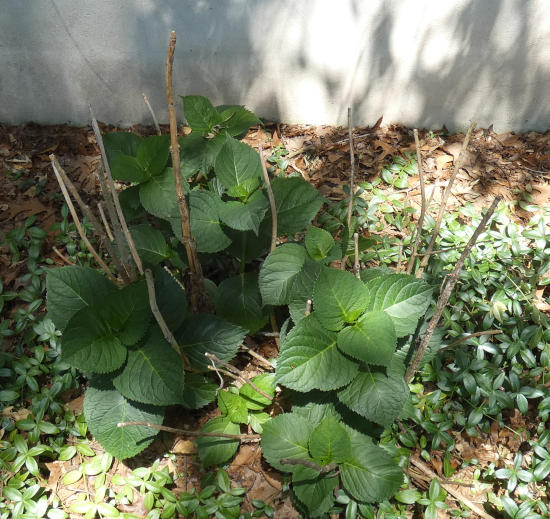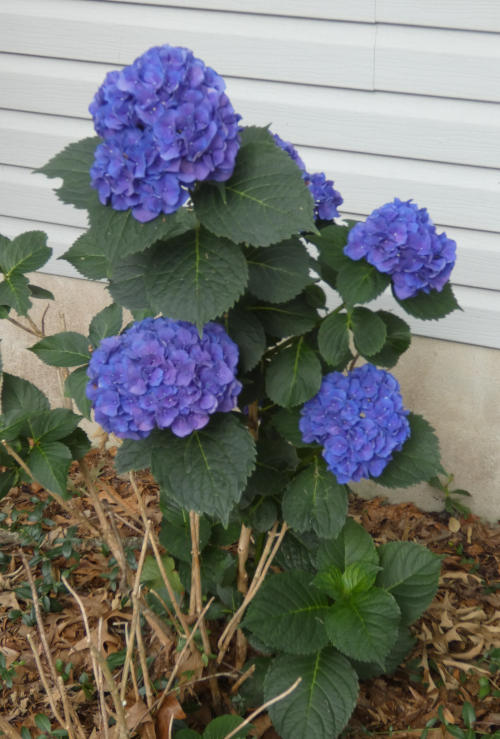A Pepper Grinder Post
One More Year
Have you ever had an experience where you felt you were acting out a Bible story? I was reminded of an instance recently where it felt like my wife and I were playing out the parts of two characters in one of Jesus's parables. It had to do with two hydrangeas behind our house.
These hydrangeas were already well-established when we bought our house twelve years ago. The first summer after we moved in, we were delighted by a profusion of beautiful pink and blue flowers on the plants. At some point, my oldest daughter cut the hydrangeas back. The next summer, the hydrangeas produced no flowers at all. No big deal. We waited until the following summer, and we were rewarded again with beautiful flowers.
I should have learned from this experience, but I didn't. At some point one autumn I noticed that our hydrangeas had nice, green, leafy areas down low, but then had dead woody stalks sticking up. Obviously, I thought, the thing to do is to cut off those dead parts. I did it, and next summer our hydrangeas, while looking green and leafy, produced no flowers. "Hmm," I reasoned. "Maybe this is like when my daughter trimmed the plants, and we missed the flowers for one summer." I waited eagerly for the next summer.
 The next summer came and went, with nice, green hydrangeas, but no flowers. This went on for a number of years. I did the research I should have done before pruning the hapless plants and discovered that those dead-looking woody stems (or at least some of them) are what produce the flowers in the type of hydrangeas we have, and that cutting them off will deprive you of a season of flowers. However, I didn't know why we had missed flowers for year after year.
The next summer came and went, with nice, green hydrangeas, but no flowers. This went on for a number of years. I did the research I should have done before pruning the hapless plants and discovered that those dead-looking woody stems (or at least some of them) are what produce the flowers in the type of hydrangeas we have, and that cutting them off will deprive you of a season of flowers. However, I didn't know why we had missed flowers for year after year.
I am not a terribly patient person, and after a few years with no hydrangea blossoms, I was ready to dig them up. My wife, on the other hand, kept wanting to give them another year. I believe that we went at least five years with non-blooming hydrangeas. I tried fertilizing the plants with fertilizer that was supposed to be good for these plants, but it seemed to make no difference.
And then, this year, something amazing happened. ONE of the two hydrangeas bloomed! Even though they were only two to three feet apart in the same soil with the same amount of sunlight and had received the same care, the one produced only leaves, while the other sprouted beautiful purple flowers. I was very glad I had listened to my wife and given it more time. Seeing what happened to the one plant gives me hope that the other might bloom next year.
Here's my translation of the parable this reminded me of:
Then he told this parable: "A man had a fig tree planted in his vineyard, and he came and looked for fruit on it, and didn't find any. He said to the gardener, 'Look, I've come looking for fruit on this fig tree for three years, and haven't found any. Cut it down! Why should it be taking up space?'
And the gardener answered, 'Lord, leave it for another year. I'll dig around it and fertilize it. If it bears fruit then, that'll be great. If it doesn't, cut it down.'" (Luke 13:6-9)
 I'm sure you see the similarity to my hydrangea story, but what was Jesus's point in telling this parable, and who was this story directed to?
I'm sure you see the similarity to my hydrangea story, but what was Jesus's point in telling this parable, and who was this story directed to?
When we look at the parable in context, we can see that it is in a larger section of teaching directed not at Jesus's disciples in particular, but to the Jewish public in general. These sayings are warning of God's judgment, if the Jewish nation doesn't turn to him wholeheartedly and accept his messiah. Here is where we've just been:
- Jesus called the crowds hypocrites because they knew how to interpret the signs of the weather, but ignored the signs of the times. (Luke 12:54-57)
- Jesus advised people to make peace with their legal adversaries before they appear before the judge. While this is often good legal advice, I think Jesus's real point is that people should make their peace with God before he comes to judge the nation of Israel. (12:58-59)
- Jesus responded to news of worshipers slaughtered by Pilate while they were offering sacrifices, and of people killed when a tower fell on them. While the crowds expected an explanation of how these people were especially bad sinners and got what they deserved, Jesus turned this around and basically said that the crowd should not be asking why these people died, but why they themselves had been spared until now. He pointed out that all who do not repent will perish, just like the victims in the news of the day. (13:1-5)
Do you see the pattern? The message is that God's judgment is coming, and the people need to get right with God before it's too late. In this context, the meaning of the parable of the hydrangea--I mean, fig tree--is plain. God is like a merciful gardener. He is willing to be patient and go to great lengths to spare his people. On the other hand, like the vineyard owner, his patience has limits. If his people do not turn to him when they see judgment coming; if they persist in resisting him and following their own ideas of what is right instead of God's; that patience will come to an end.
That is precisely what happened in the days of Jesus. Around forty years after Jesus spoke these words, the Jews rebelled against the Romans, and the Roman army captured Jerusalem and destroyed much of it. The Wailing Wall is all that remains of the glorious Temple that Christ's disciples were so impressed by. God was very patient, but eventually that patience was replaced by judgment.
If you don't believe that a loving God would ever bring harsh judgment on people, I would maintain that you are misunderstanding God's character.
- Pepper
Posted 2020-07-25
